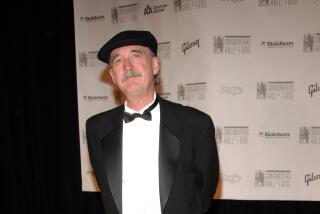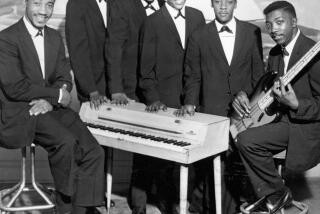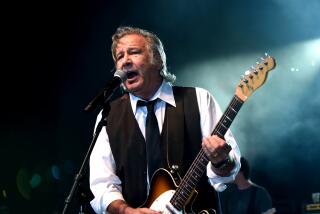J.J. Cale dies at 74; songwriter wrote ‘Cocaine’ and ‘After Midnight’
J.J. Cale, a laconic, Oklahoma-born musician who shunned the spotlight but gained fame by penning such hits as “After Midnight” and “Cocaine,” has died. He was 74.
His death from a heart attack Friday at a La Jolla hospital was disclosed on his website and by Mike Kappus, the head of his management agency.
In 1970, Cale, a self-taught guitarist, was just scraping by in Tulsa when he heard Eric Clapton on the radio singing “After Midnight.” Four years earlier, Cale had written the song and released it to deafening silence.
“I couldn’t give that record away,” he told The Times in 1988. “It stiffed so bad.”
With Cale surviving off occasional gigs at bars and irregular day jobs delivering flowers, the Clapton version struck him as a godsend.
“When I heard it,” Cale recalled, “I said, ‘Oh man, I might stay with the music business.’ ”
He did — but on his terms.
Cale was so famously publicity-shy that for the first 15 years of his career, he didn’t put his photo on any of his albums. In a business fueled by media attention, the laid-back pioneer of the down-home, bluesy style that came to be called the Tulsa Sound seldom gave interviews. And when the Oklahoma Music Hall of Fame voted him in and asked him to attend a ceremony, he respectfully declined.
Hugh Foley, a founder of the hall of fame, said Cale probably would be inducted posthumously.
Cale was known for his “laissez-faire vocal delivery and warm tones,” said Foley, author of the Oklahoma Music Guide. “He created a signature I-want-my-MTV sound of the early 1980s.”
Cale also was an audio engineer who made many of his own recordings, a virtuoso not just with his guitar — he used a beat-up Sears model for years — but also with sound equipment.
“J.J. was always crawling around on the floor plugging in wires,” said Steve Ripley, an Oklahoma musician and record producer. “It was part of the process — kind of a J.J. Cale Okie Zen.”
Cale drew devoted fans in the music industry.
In his 2007 autobiography, Clapton called him “one of the most important artists in the history of rock, quietly representing the greatest asset his country has ever had.”
The rock musician Beck praised Cale for his apparent “effortlessness.”
“The power of doing less and holding back in a song — I’ve taken a lot of influence from that,” Beck said.
Cale’s songs have been covered by many performers, including Waylon Jennings (“Louisiana Women”), Carlos Santana (“Sensitive Kind”) and Randy Crawford (“Cajun Moon”). In 2009, Cale told The Times that three of his songs — “After Midnight” and “Cocaine,” and Lynyrd Skynyrd’s “Call Me the Breeze” — provided about 80% of his income.
Cale is survived by his wife, Christine Lakeland, a vocalist and keyboardist he met in Nashville.
John Weldon Cale was born Dec. 5, 1938, in Oklahoma City and grew up in Tulsa. In 1964, after a brief tour with the Grand Ole Opry, he moved to Los Angeles. Four years later, he and some friends, calling themselves the Leathercoated Minds, put out a psychedelic-style album called “A Trip Down the Sunset Strip.” The same year, he moved back to Tulsa.
Along the way, he became J.J. Cale. There already was a rocker named John Cale, who played with the Velvet Underground.
Clapton’s “After Midnight” breathed new life into Cale’s career. He made his first album — “Naturally” — and moved to Nashville. Working from his own Crazy Mama’s studio, he worked enough over the next decade to enter what he called “semi-retirement” in California. He moved into a gleaming Airstream trailer in an Anaheim RV park and eventually settled on three acres outside Escondido.
Every few years he came out with another album. In 1990, the Times described his “Travel-Log” as “redolent of low-rent good times, barbecue smoke and corrugated metal, but there is also enough snap and sizzle … that Cale could kick the blocks away from his tires and scream down the road any time he chose.”
In 2008, he and Clapton won a Grammy for their album “The Road to Escondido.”
Escondido city fathers tried to contact him, but in a 2009 Times interview Cale said he put them off as long as he could.
“They wanted me to talk to the chamber of commerce,” he recalled. “And I said, you know, I’m not a chamber-of-commerce kind of guy.”
More to Read
Start your day right
Sign up for Essential California for the L.A. Times biggest news, features and recommendations in your inbox six days a week.
You may occasionally receive promotional content from the Los Angeles Times.








